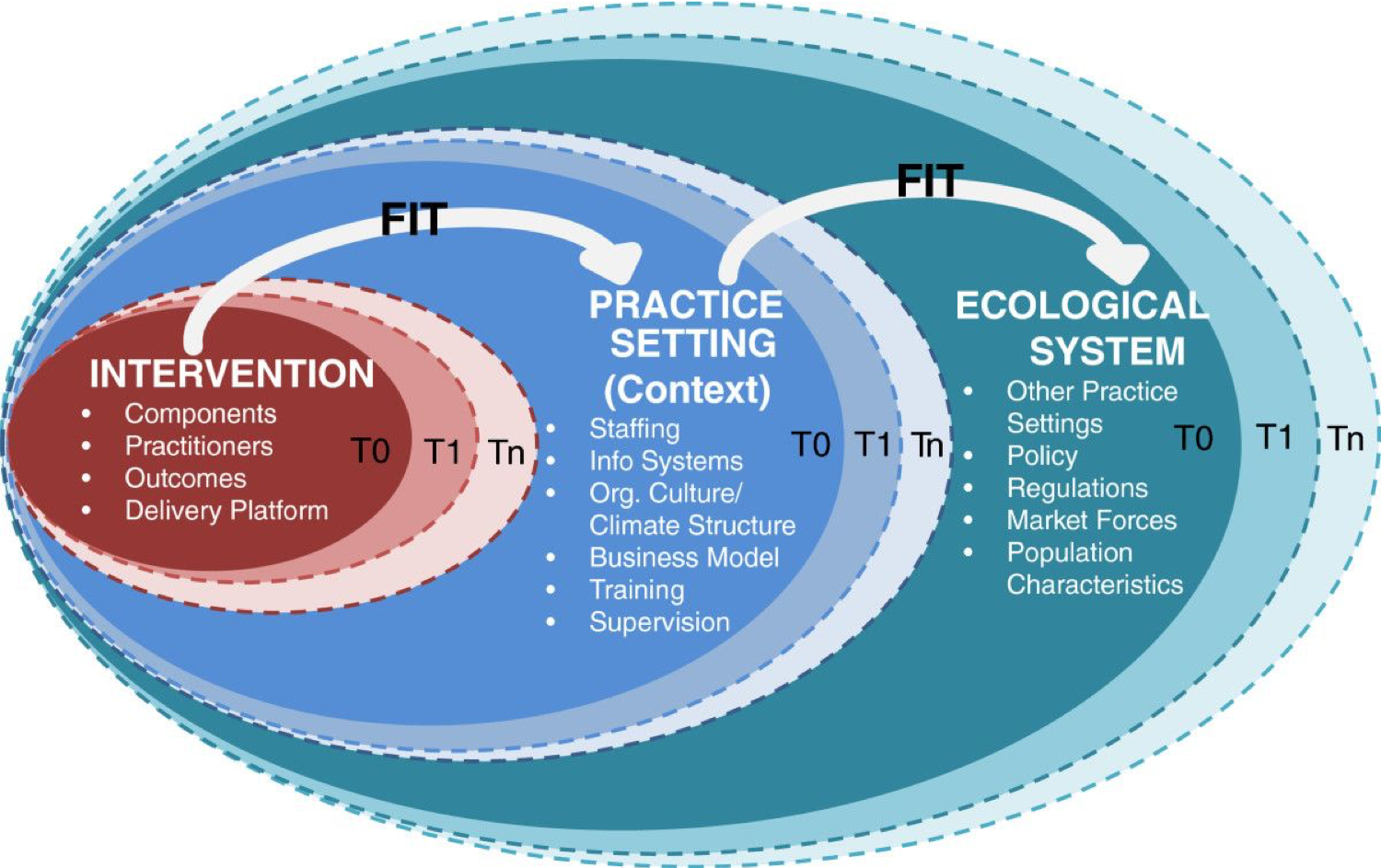Dynamic Sustainability Framework
D and/or I:
 The focus on dissemination and/or implementation activities. D-only focuses on an active approach of spreading evidence-based interventions to target audience via determined channels using planned strategies. D=I, D>I, and I>D means there is some focus on both dissemination and implementation. I-only focuses on process of putting to use or integrating evidence-based interventions within a setting.
The focus on dissemination and/or implementation activities. D-only focuses on an active approach of spreading evidence-based interventions to target audience via determined channels using planned strategies. D=I, D>I, and I>D means there is some focus on both dissemination and implementation. I-only focuses on process of putting to use or integrating evidence-based interventions within a setting.
I-Only Socio-Ecological Levels:
 The level of the framework at which the model operates. Individual includes personal characteristics; Organization includes hospitals, service organizations, and factories; Community includes local government and neighborhoods; System includes hospital systems and government; Policy includes changes in policy.
The level of the framework at which the model operates. Individual includes personal characteristics; Organization includes hospitals, service organizations, and factories; Community includes local government and neighborhoods; System includes hospital systems and government; Policy includes changes in policy.
- Individual
- Organization
- Community
- System
- Policy
Number of Times Cited:
 The # of times the original publication for the model was cited as indicated by Google Scholar since 2016.
The # of times the original publication for the model was cited as indicated by Google Scholar since 2016.
388 Field of Origin:
 The field of study in which the model originated.
The field of study in which the model originated.
Health Services Research Practitioner/Researcher:
 Whether the model is for the use of practitioners and/or researchers.
Whether the model is for the use of practitioners and/or researchers.
Researcher and Practitioner Rating:
 These are ratings given by users of the site.
These are ratings given by users of the site.
Constructs:
 Name of the construct developed by classifying/aligning the elements abstracted from models.
Name of the construct developed by classifying/aligning the elements abstracted from models.
Assessment Instruments:
 Name of the assessment developed by classifying/aligning the elements abstracted from models.
Name of the assessment developed by classifying/aligning the elements abstracted from models.
- AHRQ Digital Health Equity Framework
- Acceptability, Practicability, Effectiveness, Affordability, Side-Effects, and Equity (APPEASE)
- Clinical Sustainability Assessment Tool (CSAT)
- Consolidated Framework for Implementation Research (CFIR) Interview Guide (Lam)
- Consolidated Framework for Implementation Research (CFIR) Interview Guide (Zhao)
- Consolidated Framework for Implementation Research (CFIR) Interview Guide Webtool
- Context Matters Reporting Template
- Contextual Determinants Affecting Implementation – Qualitative Interview Guide
- Diagnosis Related Group (DRG) Policy Survey
- Dissemination and Implementation Research Capability Self-Survey (DIRC-SS)
- Faith-Based Organization Health Integration Inventory (FBO-HII)
- Glisson's Organizational Social Context (OSC)
- Implementation Citizenship Behavior Scale (ICBS)
- Implementation Climate Scale (ICS)
- Implementation Leadership Scale (ILS)
- Implementation Strategy Usability Scale
- Intervention Determinants Item Banks (IDIB)
- Intervention Scalability Assessment Tool (ISAT)
- Inventory of Factors Affecting Successful Implementation and Sustainment (IFASIS)
- Iterative, Practical, Robust Implementation and Sustainability Model (iPRISM) Webtool
- Level of Institutionalization Scale (LoIn)
- Level of Integration Measure (Clinical Practice)
- Local Wellness Policy Implementation Checklist
- Longitudinal Implementation Strategy Tracking System (LISTS)
- Normalization Process Theory Interview Guide
- Normalization Process Theory Questionnaire (NoMAD)
- Organizational readiness to change assessment (ORCA)
- Partnership/Synergy Assessment Tool
- Policy Coalition Evaluation Tool (PCET)
- Practical, Robust Implementation and Sustainability Model (PRISM) Contextual Survey Instrument (PCSI)
- Practical, Robust Implementation and Sustainability Model (PRISM) Interview Guide
- Pragmatic Context Assessment Tool (pCAT)
- Program Sustainability Assessment Tool (PSAT)
- Rapid Assessment Procedure Informed Clinical Ethnography (RAPICE) Protocol, Activity, and Interview Prompt Guide
- Rapid Assessment Procedure Informed Clinical Ethnography (RAPICE) Summary Template
- Readiness Thinking Tool - Observation Guide
- Readiness Thinking Tool - Survey
- Readiness for Recovery and Resiliency - Interview Guide
- Rehabilitation Policy Questionnaire
- Research Engagement Survey Tool (REST)
- Research Engagement Survey Tool (REST) - 9 item
- Rutten’s Health Policy Questionnaire
- Short Program Sustainability Assessment Tool (PSAT)
- Stages of Implementation Completion (SIC)
- Sustainability Model & Guide
- Sustainment Leadership Scale (SLS)
- The Change Process Capability Questionnaire
- The Implementation Quality Appraisal Checklist (IQAC)
- Therapy Process Observational Coding Systems for Child Psychotherapy- Revised Strategies Scale (TPOCS-Revised Strategies Scale)
- integrated-Promoting Action on Research Implementation in Health Services (i-PARIHS) Interview Guide
Citations:
 The original publication(s) of the model.
The original publication(s) of the model.
Chambers DA, Glasgow RE, Stange KC. The dynamic sustainability framework: addressing the paradox of sustainment amid ongoing change Implementation Science 2013;8:117 Examples:
 Citations of studies that have used the model as an outline for their study.
Citations of studies that have used the model as an outline for their study.
Carlin E, Blondell SJ, Cadet-James Y, Campbell S, Williams M, Engelke C, Taverner D, Marriott R, Edmonds K, Atkinson D, Marley JV. Study protocol: a clinical trial for improving mental health screening for Aboriginal and Torres Strait Islander pregnant women and mothers of young children using the Kimberley Mum’s Mood Scale. BMC Public Health. 2019 Nov 14;19(1):1521. doi: 10.1186/s12889-019-7845-3.Lewis CC, Scott K, Marti CN, Marriott BR, Kroenke K, Putz JW, Mendel P, Rutkowski D. Implementing measurement-based care (iMBC) for depression in community mental health: a dynamic cluster randomized trial study protocol. Implement Sci. 2015 Sep 7;10:127. doi: 10.1186/s13012-015-0313-2.
There are no reviews yet. Be the first one to write one.
